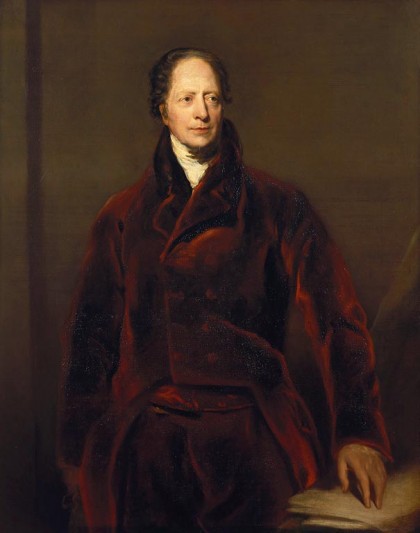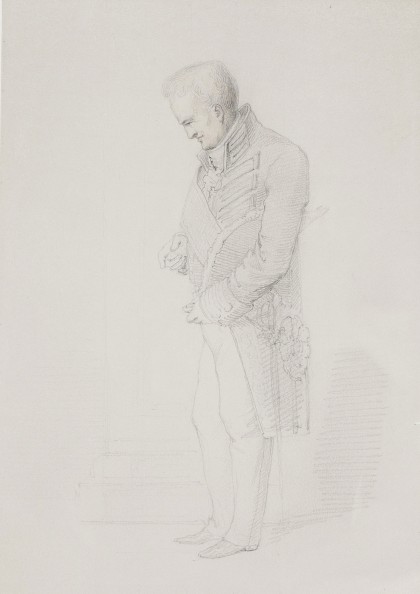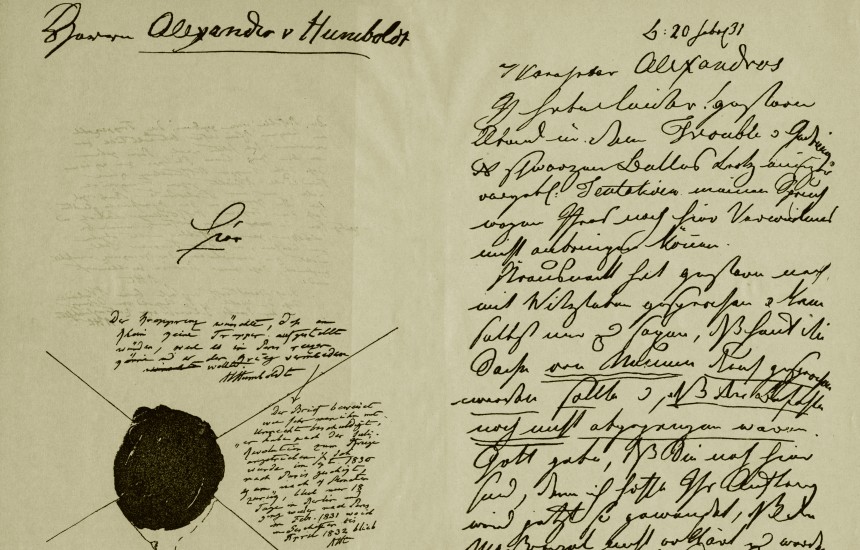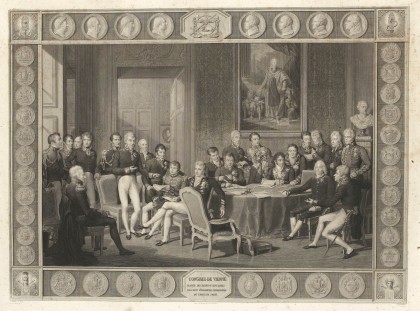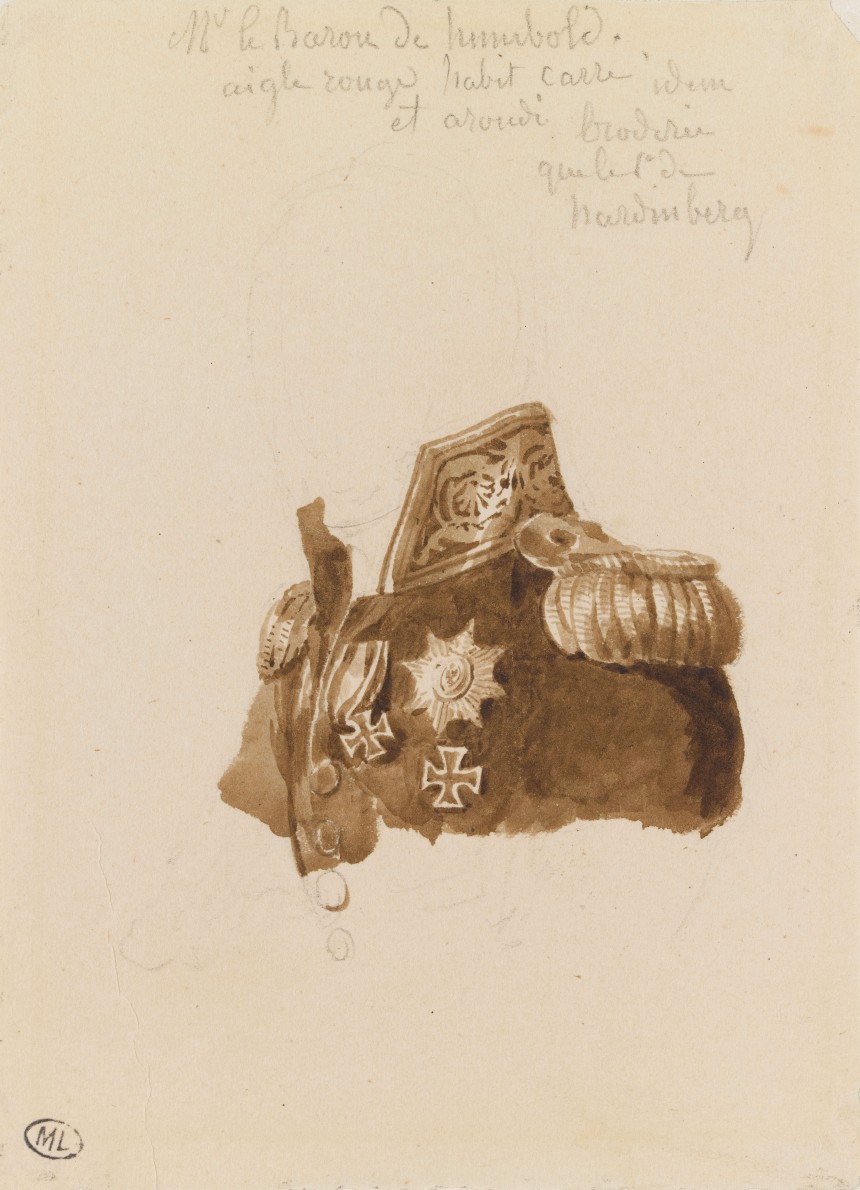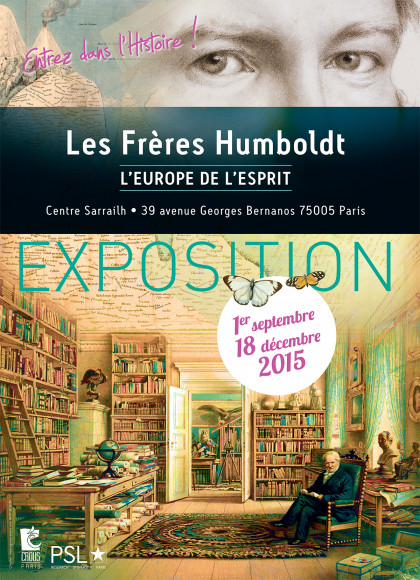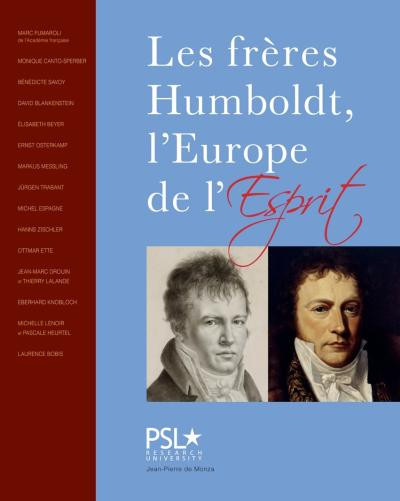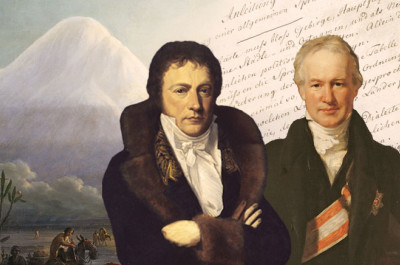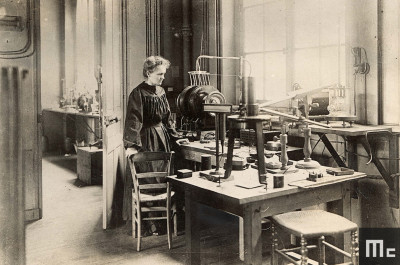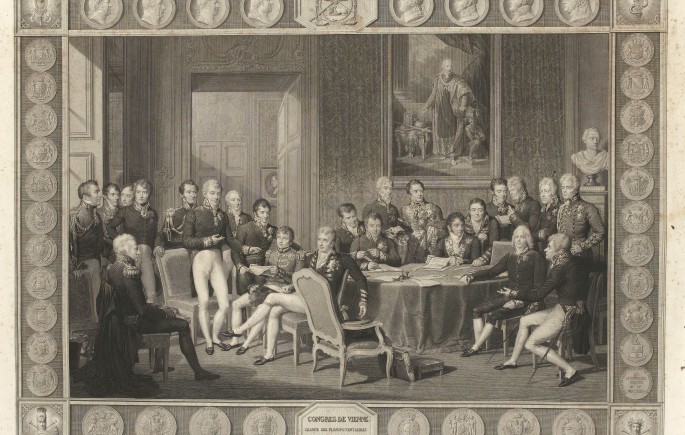
Revolution. Regeneration
The concept of Nation-State
Wilhelm and Alexander von Humboldt were both instrumental in shaping Europe's political future. Following the French Revolution and the advent of the Napoleonic Empire, members of the young European elite began reflecting on the future of nations and state within Europe; they believed it their duty to actively engage through writing, public speaking and political action. The Humboldt brothers were part of that movement.
Essay on the Limits of State Action
Although Wilhelm was fascinated by what he witnessed of the French Revolution in Paris, he was also ill at ease with the excesses that accompanied the political upheaval. He questioned the legitimacy of a State founded solely on the principles of abstract reason, devoid of a sense of history, one that neglects the human individual's social and cultural development . His reflections culminated in an important theoretical essay on the notion of the State, with a focus on the concepts of Bildung (education, or rather, self cultivation) and individuality.
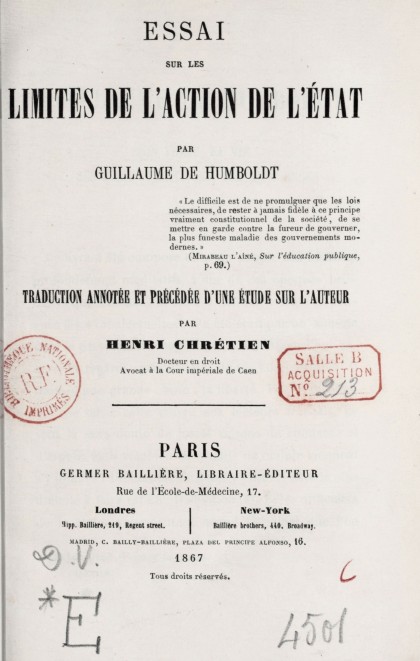
Wilhelm von Humboldt, 1867, Bibliothèque nationale de France, département Droit, économie, politique, 2012-57610. © Bibliothèque nationale de France
Wilhelm wrote his Essay on the Limits of State Action in 1792, at age 25, in the midst of the French Revolution.
In it, he advocates a liberal approach to the role of the State in society. According to Wilhelm, the State should confine its action to protecting its citizens within its frontiers and from attacks from the outside. Wilhelm also believed that the State should not intervene in matters of education but rather leave each individual free to learn, to teach and to develop fully outside the aegis of the State.
Fifteen years later, the yet unpublished text would form the foundation for the liberal reforms that Wilhelm von Humboldt was to implement in his capacity as Minister of the Prussian State.
Alexander : Political Agent
Advisor to the King of Prussia
Alexander von Humboldt refused all official functions, and yet, he found himself heavily involved in the affairs of the Prussian court. In 1805, shortly after returning to Europe, King Friedrich Wilhelm III appointed Alexander to the position of Royal Chamberlain, giving him much-needed financial support following the American expedition that had cost him a third of his inheritance.
Following the Battle of Austerlitz, Franco-Prussian relations became increasingly strained. Alexander, perfectly familiar with the French political scene, was called upon to carry out 1,807 diplomatic missions in Paris, where he was to spend the next 25 years.
A letter from Crown Prince Friedrich Wilhelm illustrates the extent to which the Prussian crown solicited Alexander to intervene with French authorities on its behalf. A born mediator, exceptionally cosmopolitan, Alexander von Humboldt was often criticized: the Prussians claimed he defended French interests while the French accused him of being a Prussian spy.
Although the diplomatic reports he filed with Berlin in the 1830's indicate his appreciation for King Louis-Philippe's liberal regime, he remained steadfastly loyal to the Prussian Crown throughout his life.
The congress of Vienna
Building a new Europe
The Congress of Vienna, held from September 1814 to June 1815, was the first in a series of international meetings designed to redefine the contours of Europe and forge a peaceful balance of power following the Napoleonic wars and Napoleon I's defeat. It was a founding moment in European diplomatic history.
By appointment of the King, Wilhelm von Humboldt accompanied Karl August von Hardenberg, the head of the Prussian delegation, to the Congress of Vienna, to negotiate territorial dispositions concerning Prussia and the creation of a German Confederation.
Prior to the Congress, Wilhelm developed a framework for addressing European issues that would prove crucial to maintaining a political balance between the major powers. He also created a diplomatic language that would make the Congress of Vienna a model for the multilateral negotiations held at the end of WWI and WWII.
Although his mission focused primarily on issues of territory and national boundaries, Wilhelm von Humboldt also exerted an influence over the Congress' other advances such as the abolition of the slave trade, free navigation, the restitution of art and artifacts stolen by Napoleon from Italy, Germany and other countries during his military campaigns, the foundation of a new German confederation or the rights of German Jews.
In preparation for the Congress , Wilhelm wrote (in French) a text entitled Le Projet pour les régulations du congrès (Proposal of Rules for the Congress), in which he anticipates the concept of a European community:
Related events and resources
Exhibition at the CROUS de Paris
In 2014, Paris Sciences et Lettres produced its first exhibition, in close collaboration with researchers and prestigious institutions in France and in Germany. One year later, PSL and the CROUS de Paris joined forces to bring the exhibit to the heart of our academic community. At the Centre Sarrailh, students, faculty and staff could visit and revisit the exhibit, discover and draw inspiration from Alexander and Wilhelm von Humboldt and their extraordinary lives of travel, scientific discovery, innovation and accomplishment.
Dates: September 1st through December 18th 2015 Entry: Free of charge
Opening hours: Open to the public Monday tnrough Friday from 9:30 am to 4::30 pm.
Place: Centre Sarraih, 39 avenue Georges Bernanos, 75005 Paris
Catalogue of the exhibition
Les frères Humboldt. L'Europe de l'esprit, publisher: De Monza, 2014, 200 pages.
This catalogue accompanies the exhibition "Les frères Humboldt, L'Europe de l'Esprit" (The Humboldt brothers – The Spirit of Europe) produced by Paris Sciences & Lettres (PSL) and shown at the Observatoire de Paris from May 15th through June 30th 2014. The catalogue is divided into 5 sections, mirroring the exhibition's main themes: "Matrix: family background and contemporary interest in classical Antiquity", "Res Publica: Revolution. Regeneration", "Europe and the World: Otherness as an intellectual horizon", "Morphologies: of parts and the whole", and "Sharing knowledge". The catalogue is far more than a simple visual reminder of the exhibition (maps, objects, letters and publications), it is also a theoretical work comprising 10 essays written by eminent scholars.
Throughout the catalogue, insets by Laurence Bobis, Director of the Observatoire de Paris library, provide the reader with additional bibliographic, political and scientific information. The catalogue is designed for the general public, for visitors to the exhibition and for informed or academic readers. Its intention is to prolong the exhibition experience and emphasize the intellectual, philosophical and ethical values to which the Humboldt brothers devoted their lives. These brilliant polymath intellectuals, one focused on science, the other on the humanities, were driven by a deep and unwavering humanism and a shared vision for a unified Europe, founded on progress and knowledge.
The catalogue can be found on most on-line book platforms as well as at the l'Ecume des pages bookshop (174 Boulevard Saint-Germain, 75006 Paris).
About the exhibition
This virtual exhibition follows on the physical exhibition The Humboldt brothers – The Spirit of Europe held at the Observatoire de Paris from May 15th through July 11th 2014. A smaller physical version of the exhibition was shown in 2015 at the Centre Sarrailh, 39 avenue Georges Bernanos, thanks to a PSL /CROUS de Paris partnership.
The Humboldt brothers have become a symbol of the intellectual, philosophical and ethical values that bind France and the Germanic World despite their tumultuous political history: a fascination for classical Antiquity and a deep attachment to rationalism and universalism. The exhibition is a first for PSL - Paris Sciences et Lettres Research University, and the first French exhibition devoted solely to the Humboldt brothers. Our goal: to open a window onto the extraordinary intellectual effervescence of a era when anything was possible, by presentation the life and work of two stellar intellectuals, their insatiable curiosity for the world around them, their commitment to advancing and sharing knowledge and science, and their incredible talent for innovation.
The Humboldt brothers influenced generations of intellectuals and scholars the world over. PSL shares their fundamental belief in the unity of the Sciences and the Arts and the academic ideals they defended: a university founded on the principles of scientific excellence, where academics and research are intimately linked, and where all disciplines coexist without boundaries, from astrophysics to the visual and performing arts, from mathematics to the humanities.
Click here to download the press kit [1502.0Ko]
Physical exhibition curated by
Bénédicte Savoy, Professor of Art history, Berlin
David Blankenstein, graduate in art history and museum studies
Produced by
Paris Sciences et Lettres Research University (PSL), in partnership with Labex TransferS.
Scientific Committee
Under the chairmanship of Marc Fumaroli, member of the Académie française.
- Elisabeth Beyer - cultural attaché in charge of books at the French Embassy in Germany
- Laurence Bobis - Director of the Observatoire de Paris library
- Monique Canto-Sperber - (then) President, Paris Sciences et Lettres Research University
- Barbara Cassin - Director of Research, CNRS
- Michel Espagne - Director, Labex TransferS
- Ottmar Ette, Professor - University of Potsdam
- Christine von Heinz – owner of Tegel Castle and the castle archives
- Ulrich von Heinz - owner of Tegel Castle and the castle archives
- Eberhard Knobloch – Professor Emeritus, Technische Universität Berlin (Technical University of Berlin)
- Michelle Lenoir, Director of the Muséum national d'histoire naturelle main library
- Central library - Henri Loyrette, Conseiller d'Etat, France
- Daniel Marchesseau, conservateur général honoraire du patrimoine (honorary Conservator General of Culture)
- Hermann Parzinger, President of the Stiftung Preußischer Kulturbesitz (Prussian cultural Foundation)
- Jürgen Trabant, Professor Emeritus, Die Freie Universität Berlin (Free University Of Berlin)
Acknowlegements
Marc Fumaroli and Monique Canto-Sperber would like to thank:
The Honorables Susanne Wasum-Rainer, German Ambassador to France
Mr. Louis Gallois and Mr. Louis Schweitzer, Commissaires généraux à l'investissement (Frenchgovernment investment comissioners)
Mr. Claude Catala, President, the Observatoire de Paris
The founding members of the Paris-Sciences et Lettres Foundation, members of Labex TransferS and and its Director Michel Espagne
La République des Savoirs and its director Antoine Compagnon
As well as:
Emmanuel Suard and Hubert Guicharrousse (Berlin, French Embassy in GermanyAllemagne), Hinrich Sieveking (Munich, Winterstein collection ), Heinrich Schulze Altcappenberg (Berlin, Kupferstichkabinett SMB-PK), Isabelle le Masne de Chermont (Paris, BNF), Caroline Noyes and Gabriel Carlier (Paris, MNHN), Manfred Gräfe and Cornelia Gentzen (Berlin, Stiftung Stadtmuseum, Humboldt-Sammlung Hein and Hausarchiv), Hans-Dieter Nägelke and Claudia Zachariae (Berlin, Technische Universität, Architekturmuseum), Stéphanie Baumewerd, Annick Trellu and Philippa Sissis (Berlin, Technische Universität, Art History Institute), Elisabeth Michel (Berlin), Sandrine Maufroy (Paris, Université Paris 4-Sorbonne), Emilie Oléron Evans (London, Queen Mary, University of London), Marie-Ange Maillet (Paris, Université Paris 8-Saint-Denis), Vincent Platini (Berlin, Freie Universität), Leah Stearns (Monticello, Thomas Jefferson Foundation at Monticello).
Project coordinators
Hélène Chaudoreille
Véronique Prouvost
Virtual exhibition production
Nathalie Figueroa
Assisted by
Annael Le Poullennec and the team at the PSL Resource and Knowledge department
Dimitri Le Meur, ENS.
Translation
Robin Silver-Delouvrier (French to English)
Voice recordings (readings)
Thomas Claret, Alice Billon, Anne Buers
Image credits
- Gottlieb Schick, Wilhelm von Humboldt, 1808, oil on canvas, 86 x 66 cm, © Berlin, Deutsches Historisches Museum
- Henry William Pickersgill, Alexander von Humboldt, 1831, oil on canvas, 142,2 x 109,2 cm © Bridgeman Art Library
- Johan Weitsch, Humboldt et Bonpland au pied du Chimborazo en Equateur (Humboldt and Bonpland at the foot of mount Chimborozo...), 1806, oil on canvas, 163 x 226 cm © BPK, Berlin, Dist. RMN-Grand Palais / Hermann Buresch
- Wilhelm von Humboldt, Anleitung zur Entwerfung einer allgemeinen Sprachkarte [Instructions for making a general map of spoken languages], annex to a letter from Wilhelm von Humboldt to Goethe dated November 15th 1812, ink on paper, © Weimar, Klassik Stiftung Weimar, Goethe und Schiller-Archiv

